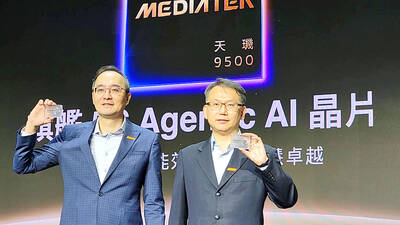Sharp Corp chief executive officer Katsuhiko Machida said prices of liquid-crystal-display (LCD) panels may stabilize in March as manufacturers stop spending in response to the global financial crisis, depleting inventories.
“The price will hit the bottom when inventories are gone, and we estimate that will happen by the end of this March,” said Machida, whose company is Japan’s largest maker of LCD televisions.
Makers of LCD panels are struggling with falling prices amid the global recession. Sharp said last month it would close LCD panel production lines at two plants in western Japan to maintain profitability.
“At their worst last year, LCD panel inventories rose to 14 million,” Machida told reporters on Tuesday in Osaka, where the company is based. “Since most LCD makers started postponing new investments last fall, supplies are decreasing rapidly.”
Demand for LCD televisions remains strong and sales are up about 20 percent compared with a year earlier, he said.
The effects of the strengthening of the yen, which rose 23 percent against the US dollar last year, may be offset by a drop in prices for steel, copper, aluminum and other materials used to make panels, Machida said.
“That drop has been even more drastic,” he said. “We can take advantage of that to improve earnings next business year.”
Sharp, which makes Aquos-brand televisions, in October cut its net income forecast 43 percent to ¥60 billion (US$669 million) for the year ending March 31.
Panasonic Corp, also based in Osaka and the world’s biggest consumer electronics maker, has since slashed its full-year profit forecast 90 percent to ¥30 billion.
Meanwhile, AU Optronics Corp (友達光電), Chi Mei Optoelectronics Corp (奇美電子) and LG Display Corp had their ratings increased at HSBC Holdings Inc.
LG Display, the world’s second-largest maker of liquid-crystal displays, and AUO, Taiwan’s largest LCD maker, were raised to “overweight” from “neutral,” analyst Frank Su (蘇榖祥) wrote in a report yesterday. Chi Mei was increased to “neutral” from “underweight.”

TECH TITAN: Pandemic-era demand for semiconductors turbocharged the nation’s GDP per capita to surpass South Korea’s, but it still remains half that of Singapore Taiwan is set to surpass South Korea this year in terms of wealth for the first time in more than two decades, marking a shift in Asia’s economic ranks made possible by the ascent of Taiwan Semiconductor Manufacturing Co (TSMC, 台積電). According to the latest forecasts released on Thursday by the central bank, Taiwan’s GDP is expected to expand 4.55 percent this year, a further upward revision from the 4.45 percent estimate made by the statistics bureau last month. The growth trajectory puts Taiwan on track to exceed South Korea’s GDP per capita — a key measure of living standards — a

Samsung Electronics Co shares jumped 4.47 percent yesterday after reports it has won approval from Nvidia Corp for the use of advanced high-bandwidth memory (HBM) chips, which marks a breakthrough for the South Korean technology leader. The stock closed at 83,500 won in Seoul, the highest since July 31 last year. Yesterday’s gain comes after local media, including the Korea Economic Daily, reported that Samsung’s 12-layer HBM3E product recently passed Nvidia’s qualification tests. That clears the components for use in the artificial intelligence (AI) accelerators essential to the training of AI models from ChatGPT to DeepSeek (深度求索), and finally allows Samsung

READY TO HELP: Should TSMC require assistance, the government would fully cooperate in helping to speed up the establishment of the Chiayi plant, an official said Taiwan Semiconductor Manufacturing Co (TSMC, 台積電) yesterday said its investment plans in Taiwan are “unchanged” amid speculation that the chipmaker might have suspended construction work on its second chip packaging plant in Chiayi County and plans to move equipment arranged for the plant to the US. The Chinese-language Economic Daily News reported earlier yesterday that TSMC had halted the construction of the chip packaging plant, which was scheduled to be completed next year and begin mass production in 2028. TSMC did not directly address whether construction of the plant had halted, but said its investment plans in Taiwan remain “unchanged.” The chipmaker started

‘COMPLEMENTARY’: The company unveiled its new Dimensity 9500 smartphone chip, which would power Vivo’s X300 series, set to launch in Taiwan in November MediaTek Inc (聯發科), the world’s largest handset chip designer, yesterday said its strategic collaboration with Nvidia Corp is on track and expected to bear fruit within two to three years, easing concerns over Nvidia’s newly announced partnership with Intel Corp to develop PC chips. MediaTek shares fell 2.43 percent to NT$1,405, underperforming the TAIEX’s 1.18 percent gain, as investors worried that Nvidia’s work with Intel might overshadow its joint PC-chip projects with MediaTek based on Arm Holdings PLC’s architecture. “We are quite complementary to one another in terms of product and technology,” MediaTek president Joe Chen (陳冠州) told reporters during the launch